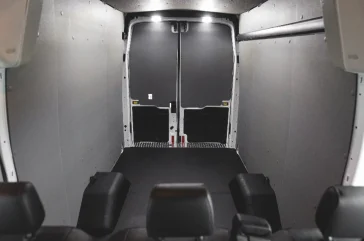
The most significant factor affecting the plywood market today is the sharp decline in available supply. Historically, around 80% of Europe’s plywood was sourced from Russia. With the onset of the Ukraine war and the resulting sanctions
on Russian exports, Europe has been forced to scramble for alternative suppliers who often produce lower-quality materials that fail to meet the standards expected.
Additionally, prominent plywood producers such as Koskisen have limited their customer base, opting to reserve their dwindling stock for existing contracts with OEMs, further driving up demand and price.
The result? Companies that rely on plywood, especially for commercial van flooring, are left with higher costs, lower-quality products and longer lead times.
These supply constraints are compounded by logistical issues, such as rising shipping costs and ongoing disruptions in global supply chains. With fewer reliable sources of high-quality plywood, companies are turning to alternative materials to meet their needs – materials like StabiliGrip.
At Legend, we mitigate such risks by maintaining a diverse supplier network internationally, ensuring that if one supplier faces disruptions, we have reliable alternatives. Our strong relationships allow us to navigate shortages more efficiently, complemented by our advanced inventory management systems that help us anticipate demand and minimise delays.
Is plywood even a viable option for work vans in 2024?
Even when plywood is available, it comes with a set of inherent problems. Plywood, particularly coated birch, is prone to warping, splintering and rot due to its porous nature. When exposed to moisture or heavy impacts, its structural integrity quickly deteriorates, which is why van flooring made of plywood often needs to be replaced within just a few years. Moreover, plywood’s susceptibility to damage from chemicals and liquids further limits its longevity, making it a poor investment for fleet operators.
Plywood is also heavy, adding unnecessary weight to vehicles – especially in the case of electric vehicles (EVs), where reducing weight is crucial for optimising battery life and range.
Composite flooring is the future
In contrast, StabiliGrip offers a long-lasting, robust alternative to plywood. Unlike traditional plywood, StabiliGrip is designed to withstand the daily wear and tear of commercial vehicle use. It’s made from composite materials that are 75% recycled, contributing to its sustainability credentials. Moreover, StabiliGrip is completely resistant to moisture, chemicals and spills, ensuring that the flooring remains safe and intact even in the harshest conditions.
Another significant advantage of StabiliGrip is its non-slip surface. Designed with fleet safety in mind, the flooring provides workers with a stable, secure surface, reducing the risk of accidents. StabiliGrip is also much lighter than plywood, making it a better choice for EV fleets or any operator looking to reduce vehicle weight and improve fuel efficiency.
An investment in durability and sustainability
Given the increasing difficulty in sourcing high-quality plywood, as well as its short lifespan and performance limitations, it’s clear that materials like StabiliGrip are the future of van flooring. While plywood may have been the go-to solution in the past, the changing market dynamics and the superior qualities of StabiliGrip make it the smarter, more sustainable choice moving forward. Investing in StabiliGrip means investing in durability, safety and long-term value – without worrying about the volatile plywood supply chain.
In an industry where operational efficiency and worker safety are paramount, it’s time to move away from outdated materials and embrace the benefits of StabiliGrip.





